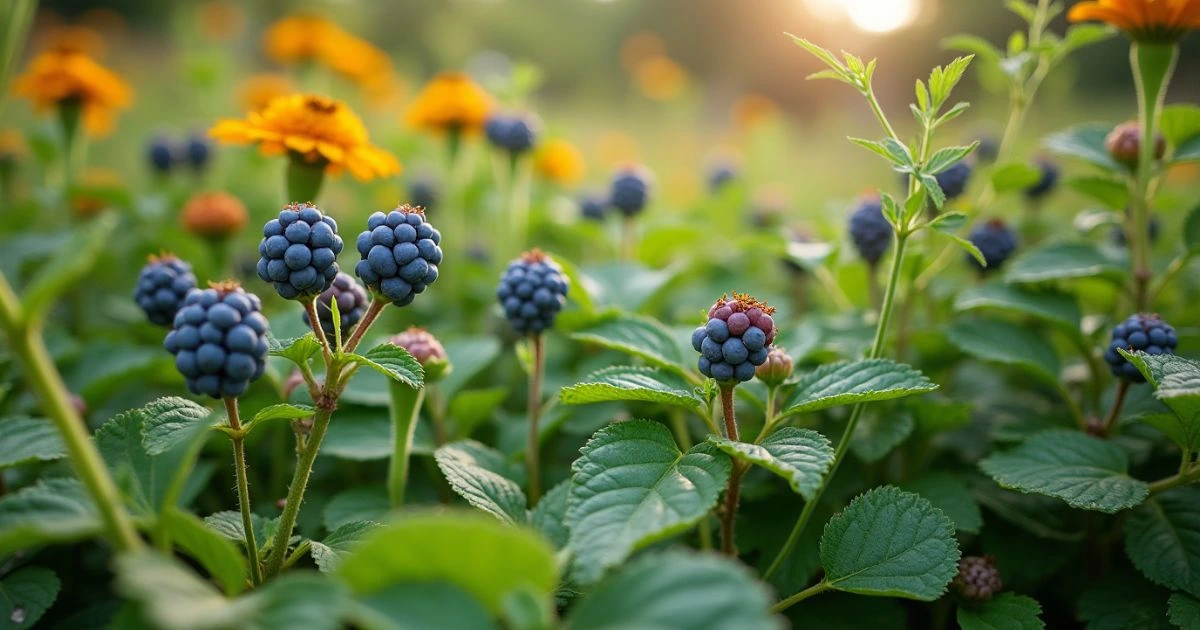If you’ve ever wondered what to plant with blueberries, you’re not alone. The right blueberry companion plants can transform your garden, improve soil health, and increase your harvest. When paired correctly, these plants create a balanced ecosystem where your blueberries thrive. This guide will walk you through 12 amazing companion plants for blueberries that offer protection, nutrients, and visual appeal.
Table of Contents
What Are Companion Plants for Blueberries?
Companion plants are those that provide mutual benefits when grown together. For blueberries, these companions help with soil health, pest control, and pollination, while also complementing each other in terms of growing conditions. Since blueberries prefer acidic soil with a pH of 4.5 to 5.5, it’s important to choose companions that thrive in similar conditions.
Why Companion Planting With Blueberries Matters
Planting companions near your blueberries has numerous benefits. Not only does it enhance your garden’s ecosystem, but it also provides a variety of advantages for your blueberry bushes, including:
- Soil Health: Companion plants such as legumes fix nitrogen into the soil, improving soil fertility for blueberries.
- Pest Control: Some companion plants, like marigolds, act as natural pest repellents, keeping harmful insects away from your blueberries.
- Pollination: By attracting pollinators like bees, some companions ensure better fruit set for your blueberry bushes.
- Microclimates: Certain companions, like ferns and lavender, provide shade and reduce moisture evaporation, keeping the soil cool and moist.
If you’ve been searching for companion planting with blueberries to boost their health and productivity, you’ve come to the right place. These 12 plants will transform your blueberry garden into a thriving, harmonious space.
Blueberry Companion Plants: 12 Perfect Partners
1. Azaleas: Acid-Loving Beauties
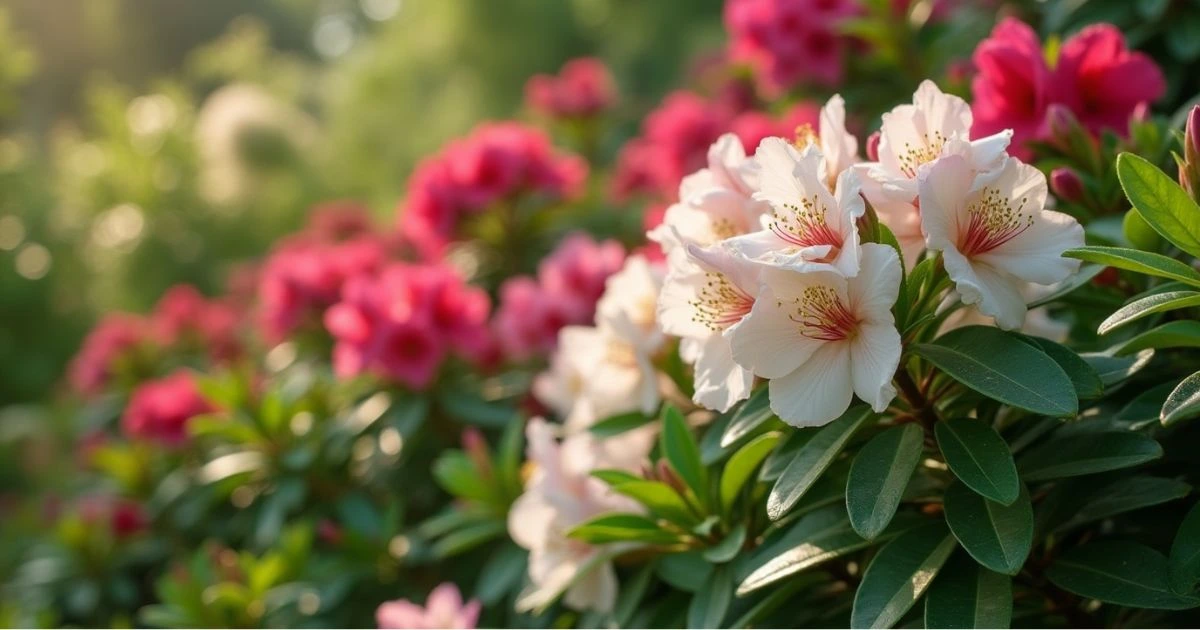
Azaleas are a wonderful choice for blueberry companions. These flowering shrubs thrive in acidic soil, just like blueberries, making them a perfect match. Azaleas provide vibrant blooms that attract pollinators and help maintain the soil’s acidity. Additionally, their shallow roots don’t compete with blueberries for nutrients, and they can create a beautiful, colorful display in your garden.
Key Benefits:
- Maintain acidic soil conditions.
- Attract pollinators with their stunning flowers.
- Bring a pop of color to your garden.
Planting Tip: Azaleas should be planted near your blueberries but not too close to prevent root crowding. Plant them along the edges of the blueberry patch.
2. Rhododendrons: Colorful and Compatible
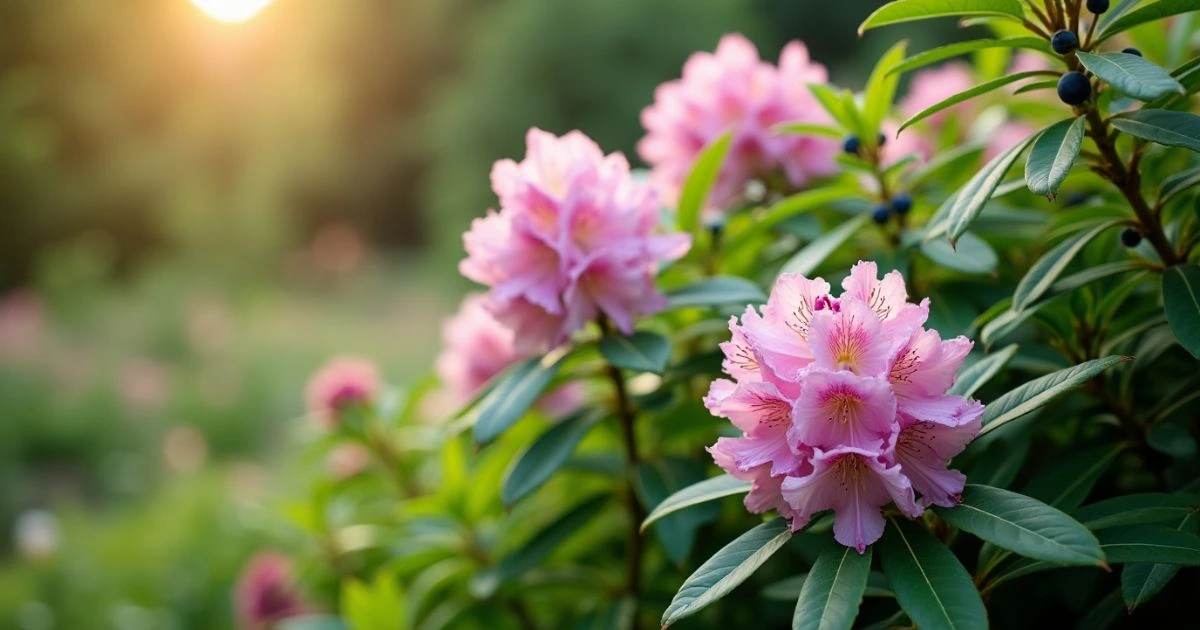
Rhododendrons are another member of the Ericaceae family, just like blueberries. Their soil needs are almost identical, and they provide a stunning ornamental display. Rhododendrons attract pollinators, which boosts the productivity of your blueberries. They also help create a natural shade for blueberries, protecting them from the hot afternoon sun.
Key Benefits:
- Share the same soil and water needs.
- Attract essential pollinators like bees and butterflies.
- Provide partial shade, reducing heat stress.
Planting Tip: Rhododendrons grow taller than blueberries, so plant them at the back or along the sides of your blueberry patch for a layered effect.
3. Cranberries: A Perfect Match
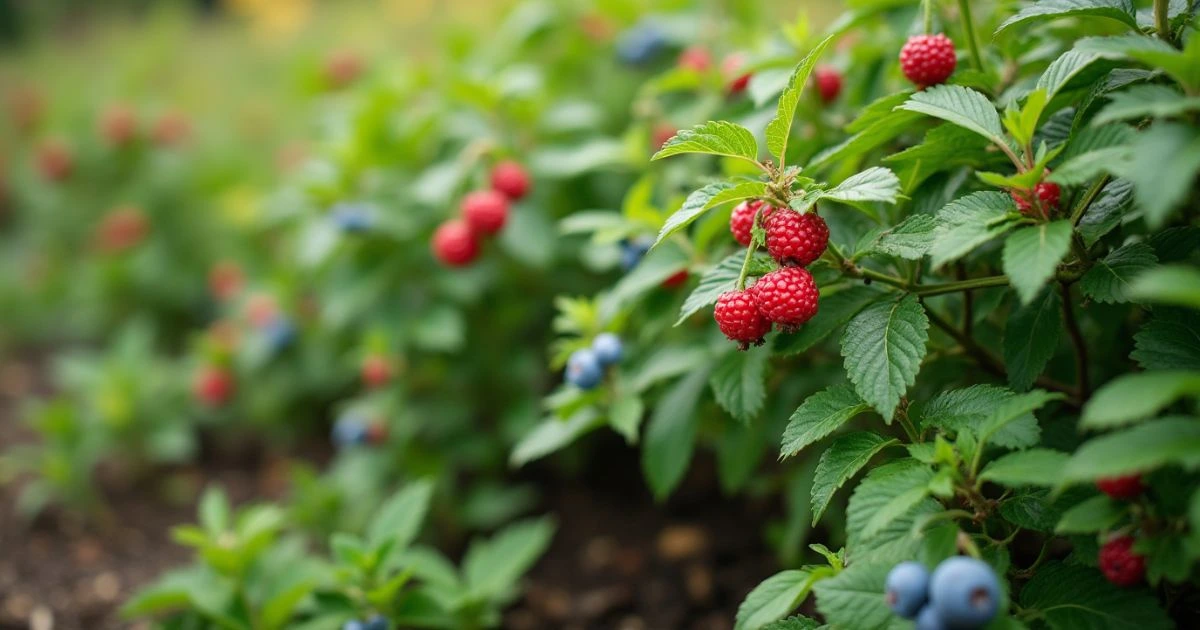
Cranberries and blueberries are both members of the heath family, and they thrive in similar acidic, moist environments. Cranberries are low-growing and spread easily, making them an excellent ground cover between blueberry bushes. Not only do they help retain moisture and suppress weeds, but they also provide an additional crop of berries to harvest.
Key Benefits:
- Flourishes in the same soil and water conditions.
- Helps retain moisture and suppress weeds.
- Produces another crop of delicious berries.
Planting Tip: Cranberries work best when planted between blueberry rows, where they can cover the soil and protect the blueberries from weeds.
4. Thyme: A Ground Cover Powerhouse
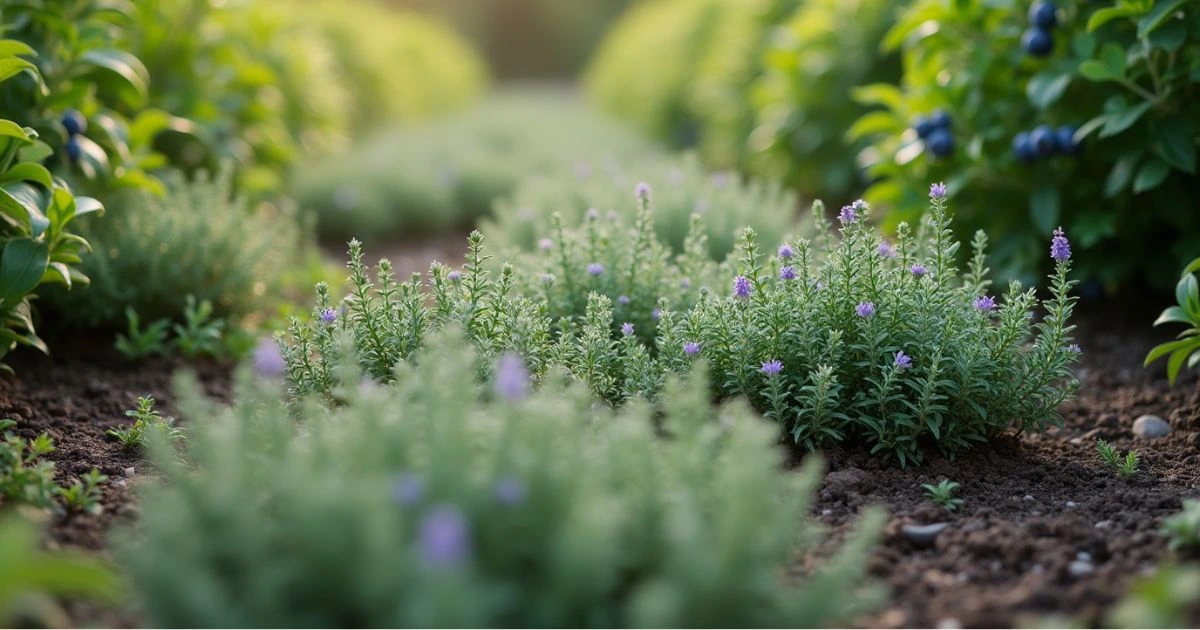
Thyme is a wonderful herb that can be grown alongside blueberries as a ground cover. This low-growing herb suppresses weeds, conserves moisture, and helps retain soil structure. Additionally, thyme’s small flowers attract pollinators, which are essential for blueberry pollination.
Key Benefits:
- Prevents weeds and retains soil moisture.
- Attracts pollinators with its fragrant flowers.
- Adds culinary value to your garden.
Planting Tip: Use creeping thyme along the edges of your blueberry patch to create a fragrant and low-maintenance border that supports both blueberries and other companion plants for blueberry.
5. Clover: The Nitrogen Fixer
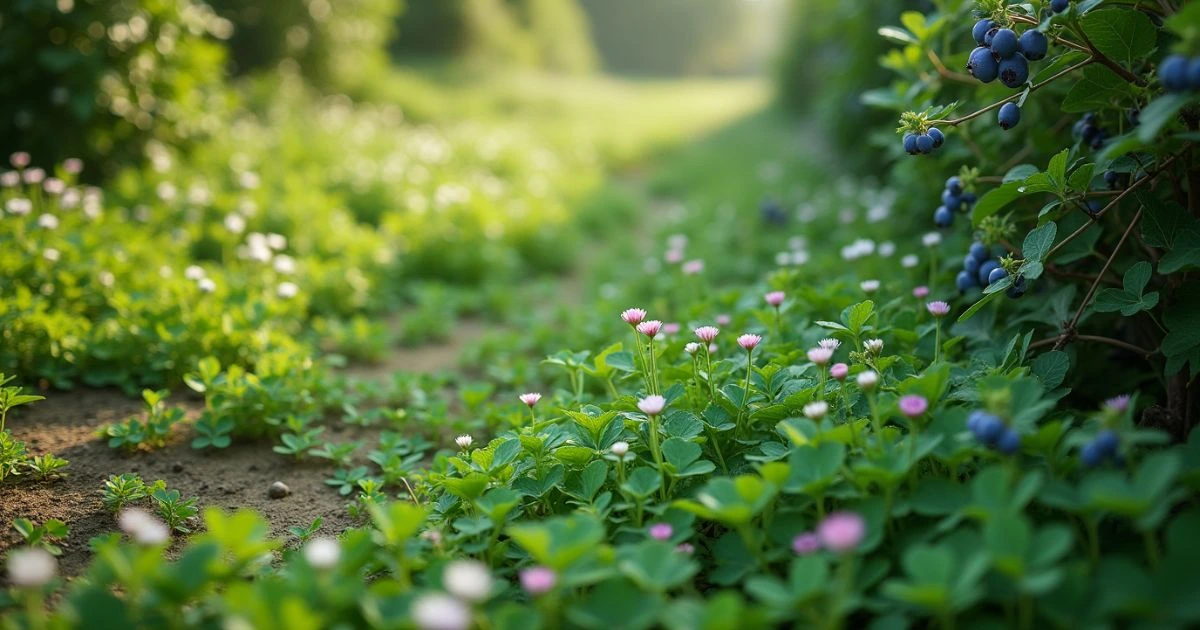
Clover is a fantastic nitrogen-fixing plant that naturally improves the soil. It works symbiotically with blueberries by enriching the soil with nitrogen, which blueberries need for healthy growth. Clover also acts as a living mulch, helping to suppress weeds, retain moisture, and prevent soil erosion.
Key Benefits:
- Adds nitrogen to the soil.
- Acts as a living mulch, suppressing weeds.
- Prevents soil erosion.
Planting Tip: Clover can be planted between rows of blueberries, creating a thick cover that benefits both the blueberries and the surrounding soil.
6. Marigolds: Pest-Repelling Heroes
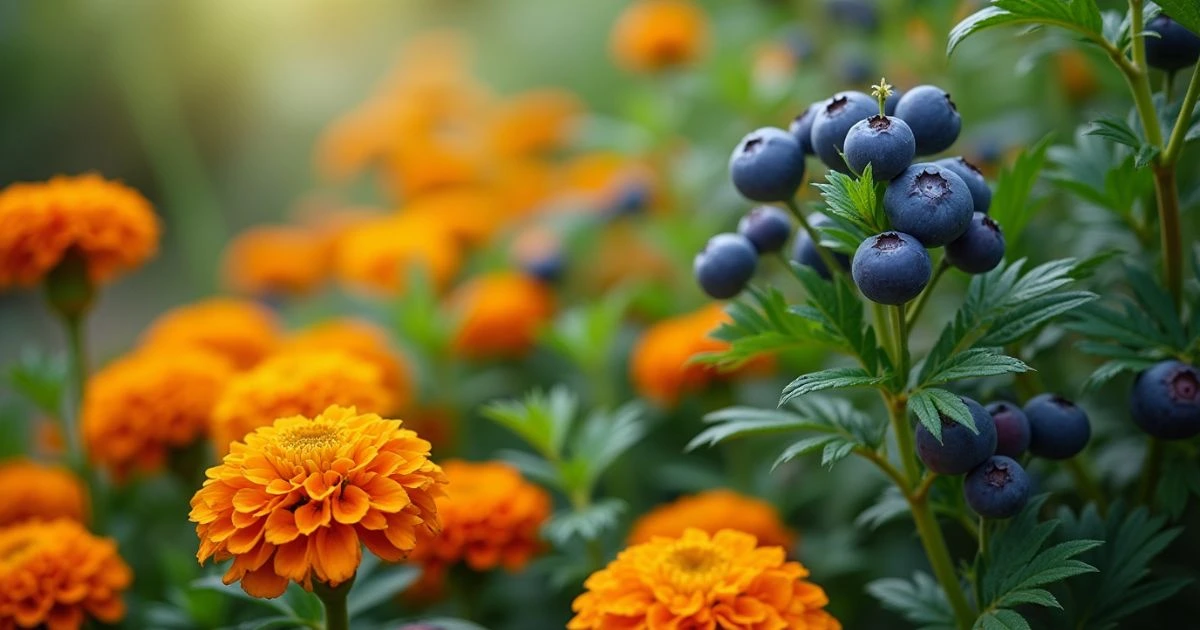
Marigolds are known for their vibrant flowers and powerful pest-repelling qualities. Their scent naturally deters aphids, nematodes, and other insects that can harm your blueberries. Marigolds are easy to grow and make an excellent addition to any garden, offering both aesthetic and functional benefits.
Key Benefits:
- Repels harmful pests like aphids and nematodes.
- Brings a vibrant burst of color to your garden.
- Are easy to grow and care for.
Planting Tip: Marigolds can be planted around the edges of your blueberry patch to form a protective barrier against pests.
7. Garlic: A Natural Shield
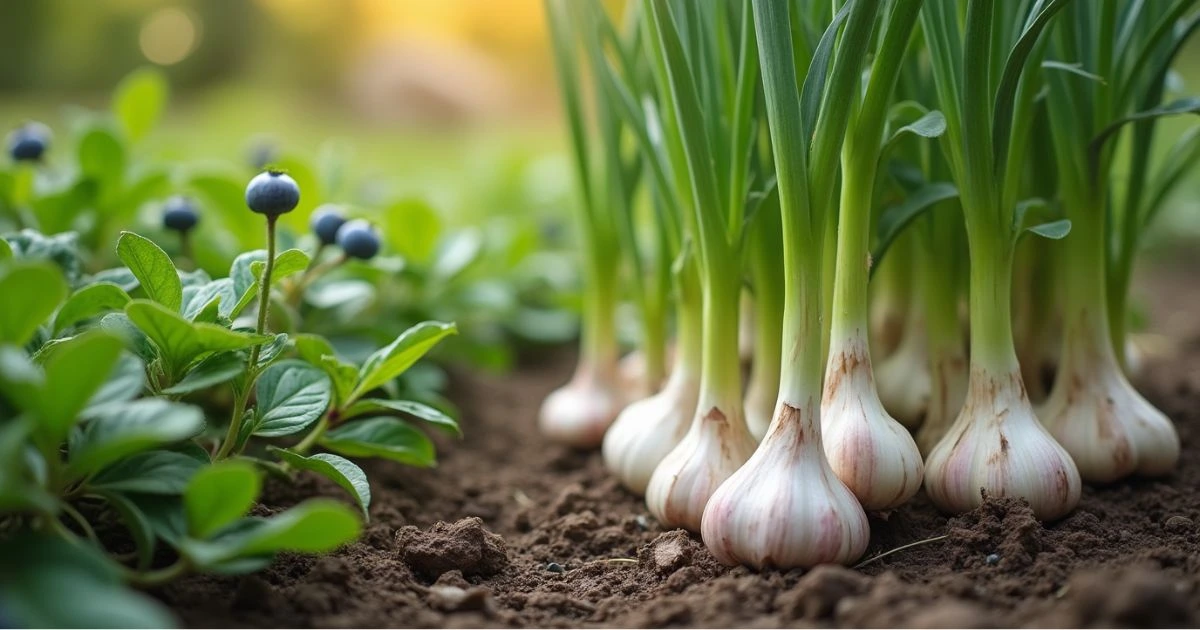
Garlic is not only a versatile kitchen herb but also a great companion plant for blueberries. Its pungent smell repels aphids, mosquitoes, and other pests that can damage your blueberries. Garlic also enhances the overall health of your garden by acting as a natural pest deterrent.
Key Benefits:
- Deters pests like aphids and spider mites.
- Low-maintenance and easy to grow.
- Adds flavor to your culinary dishes.
Planting Tip: Plant garlic cloves around your blueberry bushes to keep pests at bay while providing an additional edible crop.
8. Lavender: A Pollinator Magnet
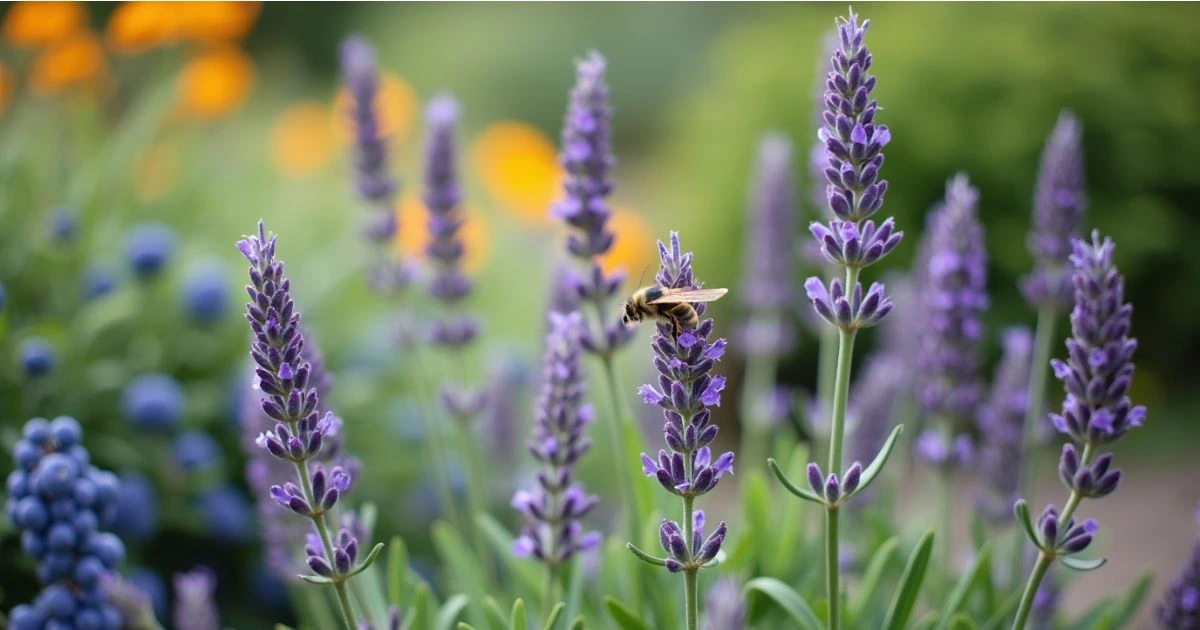
Lavender is a fragrant herb that’s known to attract pollinators such as bees and butterflies. Since pollinators are essential for blueberries to set fruit, lavender serves a crucial role in supporting your blueberry plants. It also grows well in slightly acidic soil, making it a great companion.
Key Benefits:
- Attracts pollinators like bees, which are essential for blueberry production.
- Offers a delightful fragrance and visual appeal.
- Is drought-tolerant and low-maintenance.
Planting Tip: Lavender can be planted along the edges of your blueberry patch to create a fragrant and pollinator-friendly perimeter.
9. Bee Balm: Beauty With Benefits
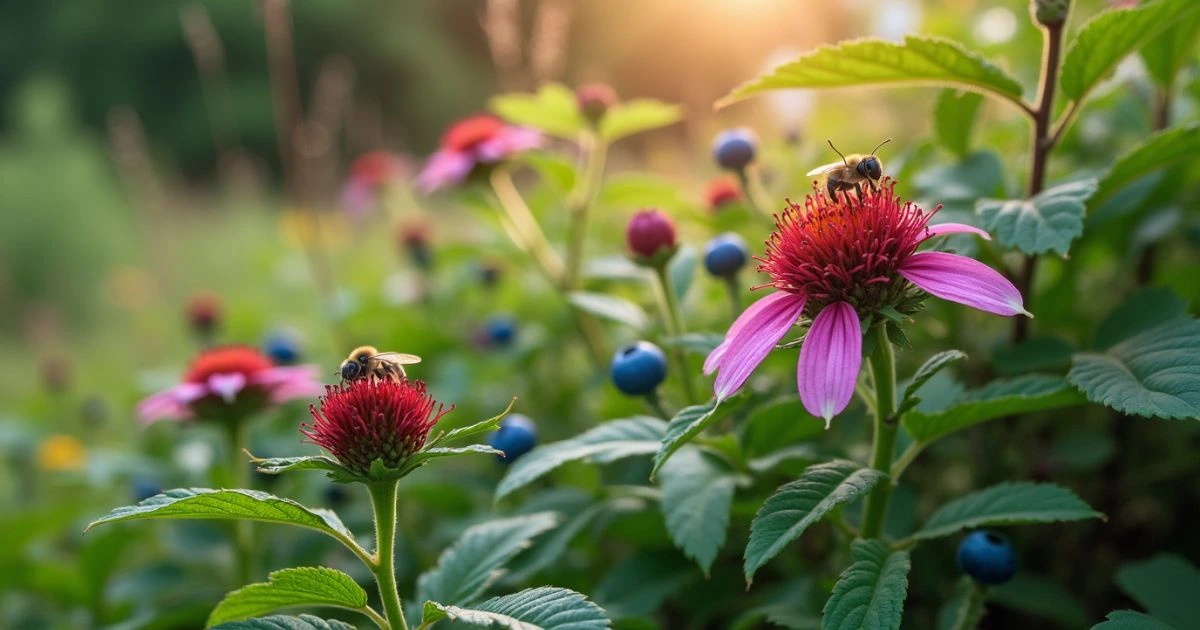
Bee balm is a colorful and fragrant herb that attracts bees and butterflies. Its vibrant flowers provide additional pollination support for your blueberries. Bee balm also grows well in slightly acidic soil, making it a perfect companion plant for your blueberry bushes.
Key Benefits:
- Attracts pollinators like bees and butterflies.
- Adds color and fragrance to your garden.
- Offers medicinal properties, such as antimicrobial benefits.
Planting Tip: Plant bee balm near your blueberries to support pollination and enhance the garden’s overall aesthetic.
10. Strawberries: Double the Harvest
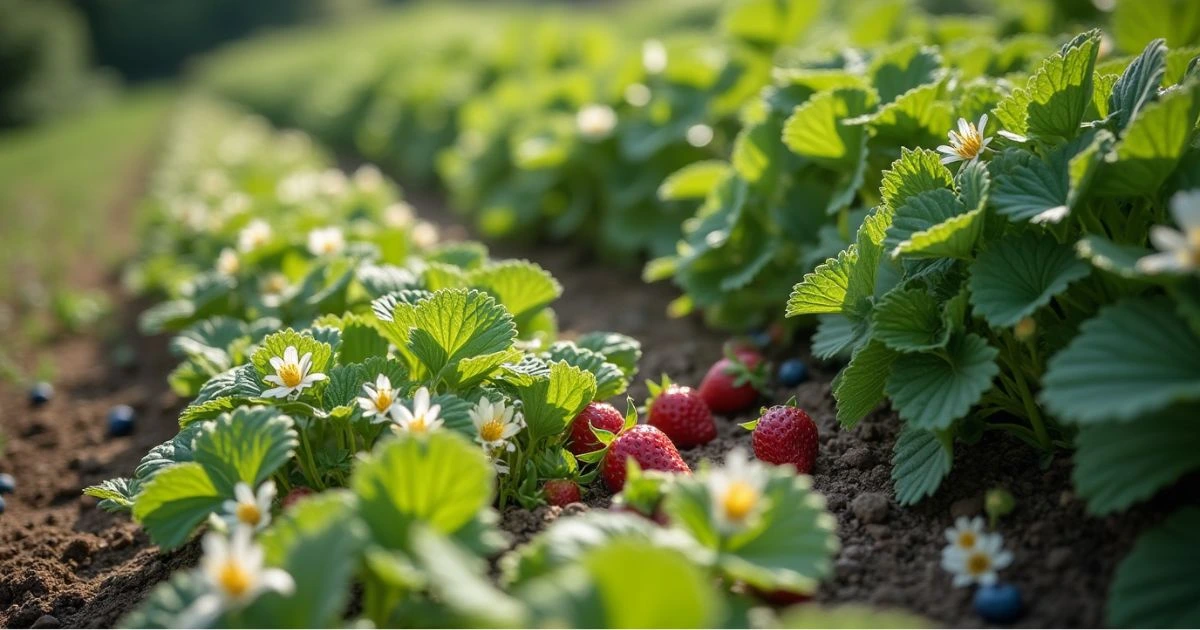
Strawberries and blueberries both thrive in acidic, well-drained soil, making them great neighbors. Strawberries can also act as a ground cover, helping to suppress weeds while providing a second crop for harvest. The strawberries’ low-growing nature won’t compete with blueberries for nutrients.
Key Benefits:
- Share similar soil needs.
- Help suppress weeds and conserve moisture.
- Provide an additional crop of berries.
Planting Tip: Plant strawberries in between blueberry rows to take advantage of the space and provide ground cover.
11. Basil: A Multi-Tasking Herb
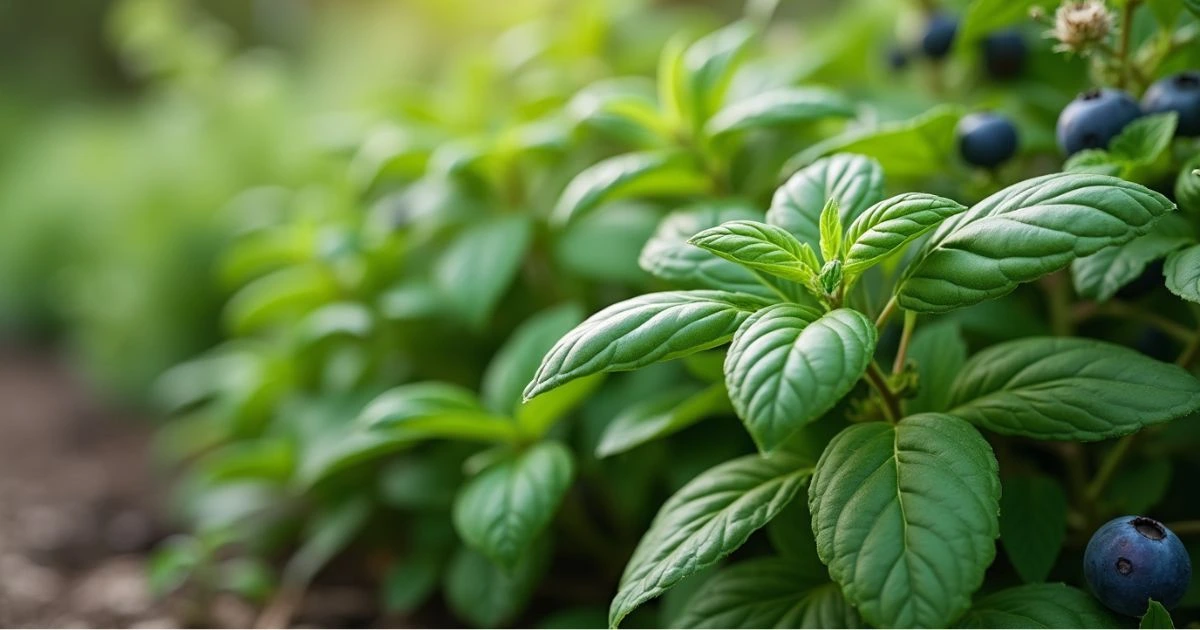
Basil is a fantastic herb that can help deter pests, such as aphids and mosquitoes, from your blueberry bushes. Its strong aroma also repels harmful insects. On top of that, basil adds culinary value and improves the flavor and health of nearby plants.
Key Benefits:
- Repels pests naturally.
- Adds flavor and fragrance to your garden.
- Improves the health of neighboring plants.
Planting Tip: Basil can be grown in pots near your blueberry bushes or planted directly in the soil to enjoy its pest-repelling benefits.
12. Ferns: Shade and Protection
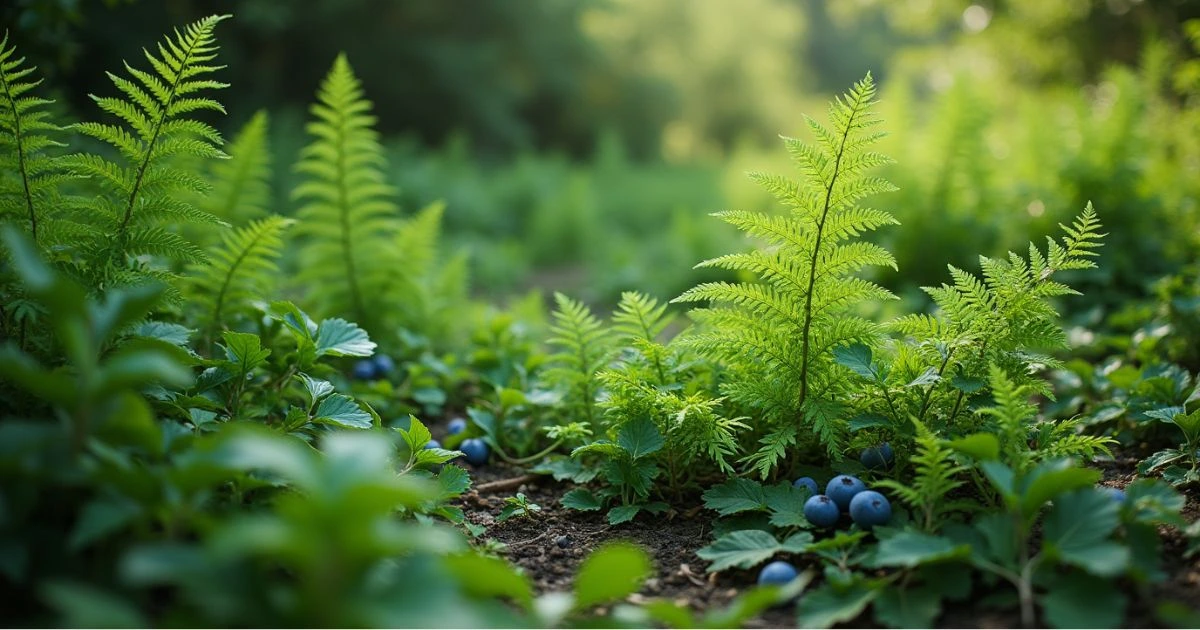
Ferns are excellent at providing shade, which can be especially helpful for blueberries in hot climates. They help keep the soil cool and moist, providing a comfortable microclimate for your blueberries. Ferns also thrive in acidic soil, making them a compatible companion for blueberries.
Key Benefits:
- Provide shade and cool the soil.
- Help retain soil moisture.
- Are low-maintenance and ornamental.
Planting Tip: Ferns can be planted along the edges of your blueberry patch to provide shade and create a natural, woodland-like environment.
Conclusion
Choosing the right blueberry companion plants is essential for maximizing your harvest and maintaining a healthy garden ecosystem. These 12 companion plants will not only help your blueberries thrive, but also bring beauty, functionality, and flavor to your garden. From nitrogen-fixers like clover to pollinator magnets like lavender, the right companions can support your blueberries in a multitude of ways.
Ready to boost your blueberry harvest? Start planting these amazing companion plants today and watch your garden thrive!
Frequently Asked Questions
1. What are the best companion plants for blueberries?
The best companion plants for blueberries include azaleas, cranberries, thyme, and marigolds. These plants thrive in similar acidic conditions and provide various benefits like pest control and moisture retention.
2. Can companion planting with blueberries improve my harvest?
Yes! Companion planting can boost pollination, enhance soil fertility, and provide protection against pests, all of which contribute to a healthier and more productive blueberry harvest.
3. How close can I plant companion plants to blueberries?
Plant companions close enough to benefit from shared resources but not so close that they compete for nutrients. Be mindful of root systems and plant height when positioning companions around blueberries.


